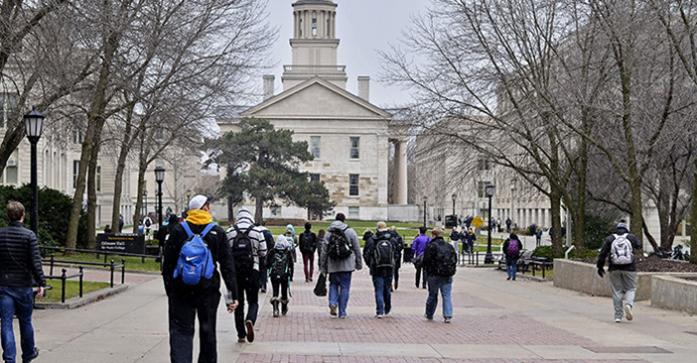Discussion at the Public Library opens a dialogue about hate speech and fear-mongering as a result of this year’s election.
By Vivian Le
Iowa City community leaders came together to promote civil discourse in light of the heated political cycle.
The Iowa City Human Rights Commission joined forces with several other local diversity and human-rights organizations Thursday to host a public discussion combating hate speech and fear-mongering rhetoric in the community.
The event, held at the Iowa City Public Library, included two sessions with varying breakout group discussions, panelists, and several keynote speakers including former Rep. Jim Leach, R-Iowa, Iowa City Mayor Jim Throgmorton, and Iowa City School District Equity Director Kingsley Botchway.
“The main and primary goal is to bring us together as a community and fight for justice all together,” said Shams Ghoneim, the head of the commission for Thursday’s event. “What hurts one hurts all.”
Ghoneim, an Egyptian-American who immigrated to the United States nearly 50 years ago, said she has never witnessed such brazen “un-American” attacks on minorities as she has in the last year.
She attributes the election cycle’s abrasive campaigns to tensions that are dividing groups in the country. As a member of the Muslim-American community, she particularly feels the attacks on her faith.
Ghoneim is committed to fighting injustice and protecting civil liberties and human rights, devoting much of her time as the coordinator of the Muslim Public Affairs Council of Iowa and vice president of American Civil Liberties Union of Iowa.
“[Having the event] before the election was critical to send a united message that we are all in this journey together and that we can engage one another respectfully and with civility across all real and/or perceived differences,” Ghoneim said.
At the event, Throgmorton addressed the increased diversity and heightened tension in Iowa City. The Iowa City City Council has discussed adopting strategic plans to advance social justice and racial equity in several of its work meetings, fostering a more inclusive and sustainable community.
“Constructed with white Iowans, professional people, and property owners in mind, many of these policies and procedures are poorly designed to facilitate the involvement of lower-income people, people who speak a language other than English, people who come from another culture,” Throgmorton said. “It’s been an ongoing thing, but much more remains to be done.”
At the event, Leach addressed the political friction and social issues by referencing aspects of American history and contemporary politics.
“We must stand together in what may be a long-term geopolitical turmoil, work to ensure our communities are hate-free zones, and see to it that our relations with people outside our borders are respected whenever and wherever possible,” Leach said.
One of the topics of conversation was how to maintain a civil dialogue between opposing opinions in order to preserve positive relations between various community groups.
“Civility is not simply or principally about manners. It doesn’t mean that spirited advocacy is to be avoided,” Leach said. “What civility does require is a willingness to consider respectfully the views of others.”
Following the presentations, community members were encouraged to network with each other and facilitate their own conversations about possible solutions.
The commission is hoping this event will be the launch pad of much-needed and ongoing conversations on so many topics next year and beyond.
“[America is] the leader of the world and must present a united front and a moral and ethical model for all to follow,” Ghoneim said.



